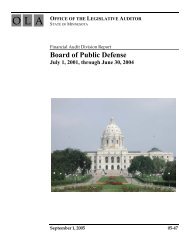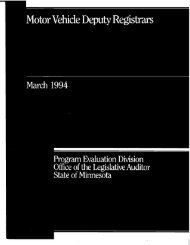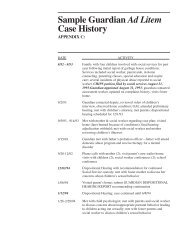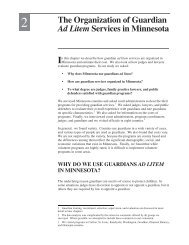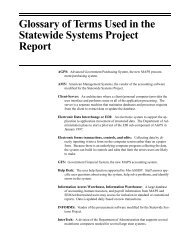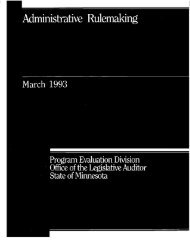Occupational Regulation - Office of the Legislative Auditor
Occupational Regulation - Office of the Legislative Auditor
Occupational Regulation - Office of the Legislative Auditor
You also want an ePaper? Increase the reach of your titles
YUMPU automatically turns print PDFs into web optimized ePapers that Google loves.
APPENDIX A 81<br />
<strong>Regulation</strong>’s Division <strong>of</strong> Pr<strong>of</strong>essions. The department provides information<br />
concerning <strong>the</strong> resources that would be needed to implement <strong>the</strong> new regulation,<br />
how <strong>the</strong> proposed legislation compares to existing regulation, and how regulation<br />
might be attained through less restrictive or more cost-effective alternatives. Staff<br />
<strong>of</strong> a relevant legislative committee compiles this information and reports back to<br />
<strong>the</strong> committee with its recommendations. Committee members <strong>the</strong>n sponsor<br />
legislation relating to <strong>the</strong> proposal as <strong>the</strong>y see fit. It should be noted that <strong>the</strong><br />
implementation <strong>of</strong> Florida’s sunrise law is dependent on <strong>the</strong> will <strong>of</strong> committee<br />
chairpersons who may choose to hear a bill proposing new occupational<br />
regulation before <strong>the</strong> completion <strong>of</strong> a formal sunrise review.<br />
Overall, Florida’s sunrise provision has been successful in limiting licensure; no<br />
groups have been licensed since it was initiated in 1991. Fur<strong>the</strong>rmore, according<br />
to legislative staff, <strong>the</strong> sunrise process is less politicized than was <strong>the</strong> sunset<br />
process, largely because <strong>the</strong> latter dealt with established regulatory bodies and<br />
pr<strong>of</strong>essional associations invested in retaining state regulation. 3<br />
Ano<strong>the</strong>r development regarding occupational regulation in Florida is <strong>the</strong><br />
privatization <strong>of</strong> <strong>the</strong> Board <strong>of</strong> Pr<strong>of</strong>essional Engineers’ staff through <strong>the</strong> creation <strong>of</strong><br />
<strong>the</strong> Florida Engineers Management Corporation (FEMC), operational as <strong>of</strong> July<br />
1998. The FEMC does not in any way replace <strong>the</strong> Governor-appointed Board <strong>of</strong><br />
Pr<strong>of</strong>essional Engineers but ra<strong>the</strong>r supplies <strong>the</strong> staff services previously performed<br />
by Department <strong>of</strong> Business and Pr<strong>of</strong>essional <strong>Regulation</strong> personnel. The FEMC<br />
was originally proposed by <strong>the</strong> Florida Engineer’s Society, which had concerns<br />
that <strong>the</strong> previously-existing departmental staffing did not develop <strong>the</strong> desired level<br />
<strong>of</strong> long-term dedication to and expertise about engineering. Some state <strong>of</strong>ficials<br />
have concerns about <strong>the</strong> legality <strong>of</strong> <strong>the</strong> FEMC, primarily related to <strong>the</strong> granting <strong>of</strong><br />
police-power to a private organization and <strong>the</strong> degree to which staff privatization<br />
might bolster <strong>the</strong> monopolistic tendencies <strong>of</strong> board regulation.<br />
MAINE<br />
Maine has a<br />
central <strong>Office</strong> <strong>of</strong><br />
Licensing and<br />
<strong>Regulation</strong>.<br />
In Maine occupational licensing activities are overseen by <strong>the</strong> <strong>Office</strong> <strong>of</strong> Licensing<br />
and <strong>Regulation</strong> in <strong>the</strong> Department <strong>of</strong> Pr<strong>of</strong>essional and Financial <strong>Regulation</strong>. The<br />
<strong>of</strong>fice is responsible for 42 boards, commissions, and registrations. There are also<br />
six independent and autonomous health boards.<br />
Hearings for initial or expanded occupational regulation are usually held by <strong>the</strong><br />
Business and Economic Development Committee, a joint House/Senate<br />
committee. 4 Occasionally bills are heard by more than one joint committee, and<br />
occasionally pr<strong>of</strong>essional groups are able to circumvent <strong>the</strong> Business and<br />
Economic Development Committee by having proposals introduced in different<br />
committees. If <strong>the</strong> bill passes <strong>the</strong> joint committee it returns to <strong>the</strong> floor <strong>of</strong> <strong>the</strong><br />
legislative body that introduced <strong>the</strong> bill. At any time <strong>the</strong> Legislature may ask <strong>the</strong><br />
3 Mr. Gip Arthur, Florida House Committee on Business <strong>Regulation</strong> and Consumer Affairs,<br />
Telephone interview, Tallahassee, Florida, August 14, 1998.<br />
4 All legislative committees in Maine are joint committees.



